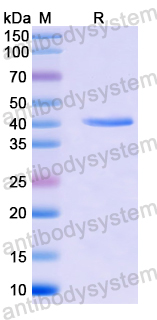Catalog No.
YHK75401
Expression system
E. coli
Species
Homo sapiens (Human)
Protein length
Gly182-Glu525
Predicted molecular weight
41.41 kDa
Nature
Recombinant
Endotoxin level
Please contact with the lab for this information.
Purity
>90% as determined by SDS-PAGE.
Accession
Q9UPT9
Applications
ELISA, Immunogen, SDS-PAGE, WB, Bioactivity testing in progress
Form
Lyophilized
Storage buffer
Lyophilized from a solution in PBS pH 7.4, 0.02% SKL, 1mM EDTA, 5% Trehalose, 2% Mannitol.
Reconstitution
Reconstitute in sterile water for a stock solution.
Shipping
In general, proteins are provided as lyophilized powder/frozen liquid. They are shipped out with dry ice/blue ice unless customers require otherwise.
Stability and Storage
Use a manual defrost freezer and avoid repeated freeze thaw cycles. Store at 2 to 8°C for frequent use. Store at -20 to -80°C for twelve months from the date of receipt.
Alternative Names
Deubiquitinating enzyme 22, USP22, Ubiquitin thioesterase 22, Ubiquitin carboxyl-terminal hydrolase 22, KIAA1063, USP3L, Ubiquitin-specific-processing protease 22
The advancement of ubiquitination regulation in apoptosis, ferroptosis, autophagy, drug resistance and treatment of cancer., PMID:40499632
USP22 promotes the proliferation and Sorafenib resistance of hepatocellular carcinoma cells via its deubiquitinase activity., PMID:40341781
USP22 enhances atherosclerotic plaque stability and macrophage efferocytosis by stabilizing PPARγ., PMID:40301680
Genome-wide association study identifies common variants associated with breast cancer in South African Black women., PMID:40229280
Targeting USP22 to promote K63-linked ubiquitination and degradation of SARS-CoV-2 nucleocapsid protein., PMID:40183543
USP22 promotes angiotensin II-induced podocyte injury by deubiquitinating and stabilizing HMGB1., PMID:40154587
USP22/BRD4 mediated hedgehog pathway activation contributes to airway remodeling in asthma., PMID:40132456
HMBOX1 reverses autophagy mediated 5-fluorouracil resistance through promoting HACE1-induced ubiquitination and degradation of ATG5 in colorectal cancer., PMID:40126194
A chromatin-focused CRISPR screen identifies USP22 as a barrier to somatic cell reprogramming., PMID:40102626
Inhibition of SCFKDM2A/USP22-dependent nuclear β-catenin ubiquitylation mediates cerebral ischemic tolerance., PMID:39934243
Inhibition of USP22 by miR-200b-5p represses gastric cancer cell proliferation and migration by targeting the NF-κB signaling pathway., PMID:39711149
USP22 Promotes Osteosarcoma Progression by Stabilising β-Catenin and Upregulating HK2 and Glycolysis., PMID:39661501
USP22 inhibits microglial M1 polarization by regulating the PU.1/NLRP3 inflammasome pathway., PMID:39631712
METTL14-mediated m6A modification enhances USP22-ERα axis to drive breast cancer malignancy., PMID:39557350
Quercetin prevents the USP22-Snail1 signaling pathway to ameliorate diabetic tubulointerstitial fibrosis., PMID:39556027
A positive feedback loop of SRSF9/USP22/ZEB1 promotes the progression of ovarian cancer., PMID:39530604
USP22 promotes gefitinib resistance and inhibits ferroptosis in non-small cell lung cancer by deubiquitination of MDM2., PMID:39315600
The p-MYH9/USP22/HIF-1α axis promotes lenvatinib resistance and cancer stemness in hepatocellular carcinoma., PMID:39300073
A new digital droplet PCR method for looking at epigenetics in diffuse large B-cell lymphomas: The role of BMI1, EZH2, and USP22 genes., PMID:39255961
Hepatocyte growth factor promotes melanoma metastasis through ubiquitin-specific peptidase 22-mediated integrins upregulation., PMID:39222676
Epinephrine promotes breast cancer metastasis through a ubiquitin-specific peptidase 22-mediated lipolysis circuit., PMID:39151008
The Deubiquitinase USP22-Stabilized COL17A1 Promotes Lung Adenocarcinoma Progression., PMID:39143031
Ubiquitin-specific protease 22 controls melanoma metastasis and vulnerability to ferroptosis through targeting SIRT1/PTEN/PI3K signaling., PMID:39135915
Ubiquitin-Specific Protease 22 Plays a Key Role in Increasing Extracellular Vesicle Secretion and Regulating Cell Motility of Lung Adenocarcinoma., PMID:39101247
O-GlcNAcylated RALY Contributes to Hepatocellular Carcinoma Cells Proliferation by Regulating USP22 mRNA Nuclear Export., PMID:38993567
The secoiridoid glycoside Gentiopicroside is a USP22 inhibitor with potent antitumor immunotherapeutic activity., PMID:38968798
USP22 is required for human endometrial stromal cell proliferation and decidualization by deubiquitinating FoxM1., PMID:38897527
Overexpression of USP22 ameliorates LPS-induced endometrial stromal cells inflammation and modulates cells decidualization by inhibiting ferroptosis., PMID:38896999
A protein sequence-based deep transfer learning framework for identifying human proteome-wide deubiquitinase-substrate interactions., PMID:38806474
USP22 as a key regulator of glycolysis pathway in osteosarcoma: insights from bioinformatics and experimental approaches., PMID:38784391
De novo variants in ATXN7L3 lead to developmental delay, hypotonia and distinctive facial features., PMID:38753057
Hypoxic adipose stem cell-derived exosomes carrying high-abundant USP22 facilitate cutaneous wound healing through stabilizing HIF-1α and upregulating lncRNA H19., PMID:38738548
Mogrol-mediated enhancement of radiotherapy sensitivity in non-small cell lung cancer: a mechanistic study., PMID:38682239
Tumor-associated macrophage-induced circMRCKα encodes a peptide to promote glycolysis and progression in hepatocellular carcinoma., PMID:38642609
Ubiquitin-specific protease 21 promotes tumorigenicity and stemness of colorectal cancer by deubiquitinating and stabilizing ZEB1., PMID:38577450
FOXP3 (in)stability and cancer immunotherapy., PMID:38547750
EZH2 Inhibition Enhances PD-L1 Protein Stability Through USP22-Mediated Deubiquitination in Colorectal Cancer., PMID:38520088
USP22 regulates APL differentiation via PML-RARα stabilization and IFN repression., PMID:38467608
USP11 Exacerbates Radiation-Induced Pneumonitis by Activating Endothelial Cell Inflammatory Response via OTUD5-STING Signaling., PMID:38364946
Unveiling hormone-stimulated gene mechanisms in prostate cancer: A prognostic model, immune infiltration analysis, and drug sensitivity study., PMID:38361268
USP22 supports the aggressive behavior of basal-like breast cancer by stimulating cellular respiration., PMID:38347585
Evaluation of USP22 and Ki-67 expression in oral squamous cell carcinoma: An immunohistochemical study., PMID:38304522
CTRP9 prevents atherosclerosis progression through changing autophagic status of macrophages by activating USP22 mediated-de-ubiquitination on Sirt1 in vitro., PMID:38280475
USP22 overexpression fails to augment tumor formation in MMTV-ERBB2 mice but loss of function impacts MMTV promoter activity., PMID:38236941
ADAM9 deubiquitination induced by USP22 suppresses proliferation, migration, invasion, and epithelial-mesenchymal transition of trophoblast cells in preeclampsia., PMID:38176298
Ubiquitin-specific protease 22 promotes tumorigenesis and progression by an FKBP12/mTORC1/autophagy positive feedback loop in hepatocellular carcinoma., PMID:38045832
Integrative analysis of histone acetyltransferase KAT2A in human cancer., PMID:38007639
Inhibition of USP7 upregulates USP22 and activates its downstream cancer-related signaling pathways in human cancer cells., PMID:37946202
USP22-JMJD8 axis promotes Lenvatinib resistance in hepatocellular carcinoma., PMID:37898375
Usp22 Deficiency Leads to Downregulation of PD-L1 and Pathological Activation of CD8+ T Cells and Causes Immunopathology in Response to Acute LCMV Infection., PMID:37896966

